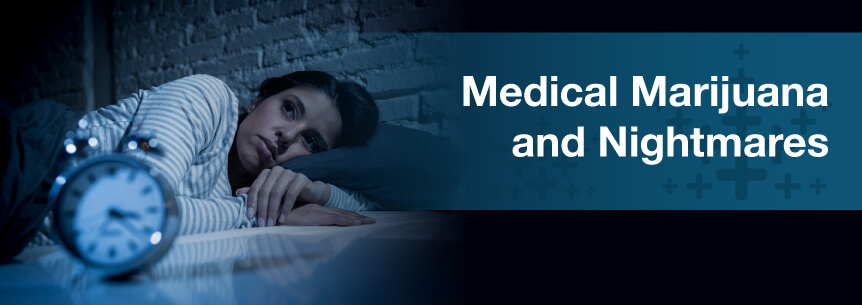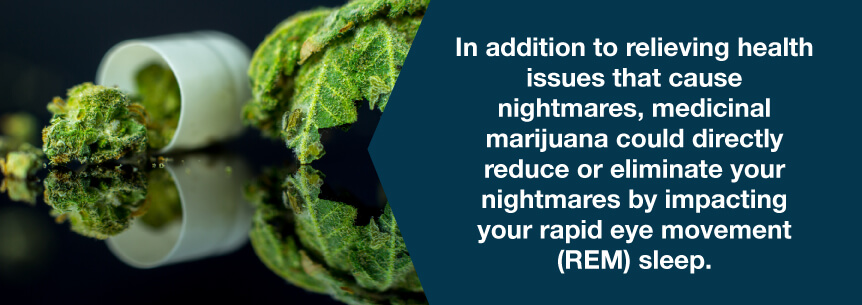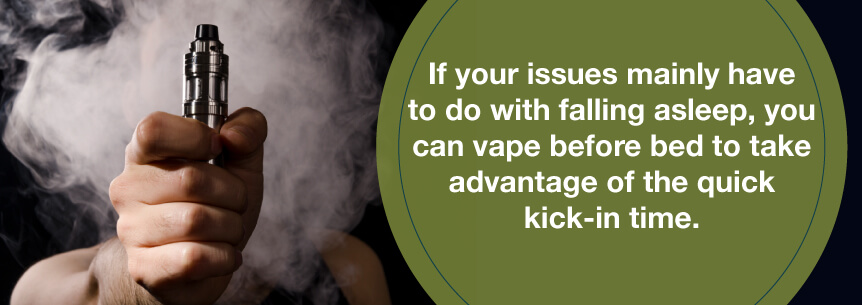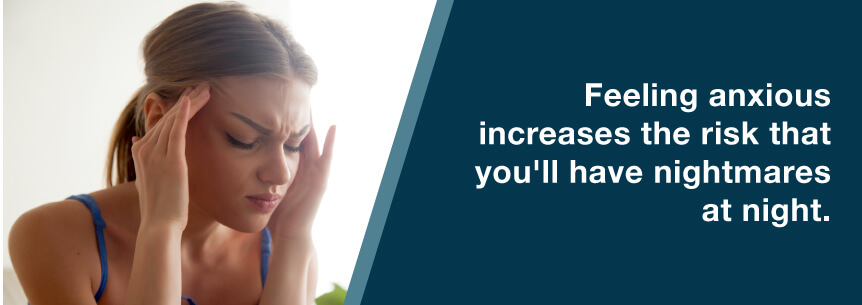
Many of us have experienced a bad dream, but when someone has intense, reoccurring nightmares, they can act as a sleep disorder of their own. Estimates show that two to eight percent of people have nightmares severe enough to cause sleep issues.
Although cognitive behavior therapy has shown promise as a treatment for nightmares, it can take a considerably long time to see results, and its success may depend on the underlying cause of the nightmares. Most of the medications that are used to treat nightmares come with their own long list of potentially negative side-effects.
Medical marijuana is a safer, potentially more effective alternative. It may work to reduce anxiety, alleviate depression and decrease insomnia. Also, when the underlying cause of nightmares is anti-anxiety or narcotic-based pain medication, medical marijuana may provide an alternative, which in turn removes the cause of the nightmares.
More and more patients are choosing cannabis medicine as a supplement or replacement for their nightmare treatment, and you could, too. In this guide, we’ll give you the information you need to make an informed decision about treating your nightmares with medical marijuana. Keep reading to learn:
At MarijuanaDoctors.com, we aim to give doctors and patients the resources they need to give and receive medical marijuana treatment. Have further questions about nightmare disorders and other sleep-related conditions? Check out our other condition guides and resource library.
Find A Doctor Find A Dispensary
When standard nightmare treatments just won’t do the trick, marijuana medicine can tackle many of the underlying causes of nightmares. In fact, it can help relieve most of the causes we mentioned earlier:
In addition to relieving health issues that cause nightmares, medicinal marijuana could directly reduce or eliminate your nightmares by impacting your rapid eye movement (REM) sleep. When you sleep at night, your brain and body cycle through different stages that give you important forms of rest. While most of these stages don’t involve REM sleep, REM sleep happens as its own phase. During this period of the sleep cycle, your eyes move rapidly, and you experience dreams.

Evidence suggests that medical marijuana can suppress REM sleep, making you dream less or stop dreaming at all. For people who experience frequent nightmares, removing dreams gets rid of the bad dreams, too.
Medical marijuana has been relied on, and used, for centuries to reduce stress, tension and anxiety. Recent studies that have been done on patients suffering from anxiety or stress have confirmed what numerous cultures have known for centuries — that many patients do report a decrease in anxiety levels with the use of medical marijuana. Conversely, some patients show an increase in anxiety when using medical marijuana. Individual body chemistry may be the key to why some patients actually report an increase in anxiety. For those who experience a decrease in anxiety, medical marijuana may be an alternative to conventional anti-anxiety or anti-depressant medications that are at the root of the patient’s nightmares. When the THC found in marijuana reacts with a brain substance known as anandamide, it has been shown to produce a calming effect throughout the body, thereby reducing anxiety.
Nightmare sufferers who also suffer from insomnia or sleep deprivation may be able to get relief from medical marijuana as well. Because the chemical properties found in marijuana create a calming effect throughout the body, patients may find that sleep comes easier and is interrupted less often by nightmares. For nightmare sufferers who suspect that narcotic-based medications may be contributing to their nightmares, medical marijuana may allow them to reduce the amount of opiate-based medications they are taking. A recent study showed that patients taking opiate-based pain medications were able to reduce their opiate based medication by augmenting their medication with medical marijuana while still experiencing the same degree of pain relief.
A 2009 study by Dr. George Fraser suggested that nabilone, a synthetic cannabinoid, could reduce or eliminate nightmares in PTSD patients. Nabilone works like the components in marijuana, cannabinoids, by activating special receptors in your cells. It relieves common symptoms addressed with medical marijuana like severe nausea and vomiting. But, Dr. Fraser wanted to see if it could impact nightmares after seeing plenty of anecdotal evidence from medical marijuana patients. So, he conducted a chart review of PTSD patients he treated with nabilone. An impressive 72% of his 47 patients reported a total cessation of nightmares or a large reduction in the intensity of their bad dreams.
Nightmares can result in health issues that can severely impact your everyday life. Fortunately, medicinal cannabis addresses symptoms caused by nightmares such as:
The cannabis plant contains a veritable pharmacy of compounds that can relieve a wide variety of health problems. You can find at least 85 different compounds called cannabinoids that have unique curative properties. We have the most knowledge about the two major cannabinoids, cannabidiol (CBD) and tetrahydrocannabinol (THC). Both these cannabinoids can work to relieve nightmares. While THC suppresses REM sleep and reduces bad dreams, CBD improves mood and rest.
If you’re new to medical marijuana, you might think that you can only take it by smoking. But this misconception doesn’t give the versatility of cannabis medicine the credit it deserves. There’s a medication method out there for every kind of patient, whether you want a more traditional medicating experience or prefer unconventional approaches. Medicinal marijuana can come in the form of:
The type of marijuana medicine you choose mainly depends on your personal preferences and lifestyle, but some products will work better for your nightmare symptoms than others. For example, if your issues mainly have to do with falling asleep, you can vape before bed to take advantage of the quick kick-in time. Or, you could use a patch to get a continuous release of cannabis medicine into your system throughout the night. For more help choosing a medication, talk with your doctor or dispensary budtender.

If you like to medicate with marijuana flower or certain other types of medicine, the cannabis strain will factor into your choice. The marijuana plant comes in three different strains, or varieties, that specialize in treating specific symptoms. A medicinal cannabis professional can help you understand the differences among the three, but you should have a basic understanding of them:
Many strains earn reputations of addressing specific symptoms in particular. For example, White Rhino and Bubba Kush are known for their sedative properties and let you sleep longer.
Marijuana medicine can cause side effects like any other medication, but it tends to have milder and less dangerous adverse effects than pharmaceuticals. Some strains and dosages have a higher chance of certain side effects than others, but many of them can be resolved by adjusting your cannabis medication. Common side effects of medicinal marijuana include:
Take your treatment into your own hands with medical marijuana. Medicinal cannabis’ holistic approach lets your medicine work with your whole body, rather than just treating specific symptoms. If you want to start medical marijuana treatment, follow these simple steps:
Even if your state lets adults over 21 buy and use recreational marijuana, you should still work with a doctor to create a treatment plan. They understand how cannabis medicine works with your body, so they can give you professional advice you can’t find elsewhere.
Find A Doctor Find A Dispensary
Most people have their first nightmares between three and six years of age and start to have fewer nightmares after age 10. Nightmares are healthy and normal as long as they happen occasionally and don’t cause major problems. Harmless nightmare activity involves:

Meanwhile, you should get medical attention for your nightmares if they cause issues like:
Even if you don’t feel you have these issues, you should tell your doctor if you have nightmares on a frequent basis. They could have a bigger impact on your sleep quality than you may think.
When a doctor diagnoses nightmares, they add certain specifiers that show the frequency and duration of the dreams. The following adjectives are used based on how long you experience frequent nightmares:
Once determining how to describe the duration of your nightmare problems, your doctor will then categorize their frequency:
Nightmare disorders can come in many forms, all of which interfere with the patient’s well-being. But, why do nightmare disorders occur in the first place?
Numerous factors can cause you to have severe and frequent nightmares, including:

When nightmares negatively impact your health, you might need medical treatment. The treatment a physician orders depends on the cause of the nightmares, and multiple factors could be at play. Patients with nightmares most commonly receive the following kinds of treatments:
In some cases, your doctor may suggest some lifestyle changes before asking you to go through medical treatment. You could talk about the dream with someone else after you have it or write in a notebook about it. If your nightmares happen due to sleep problems, your doctor might ask you to establish a consistent bedtime routine. Stress-relief activities could also reduce your nightmares if they have to do with anxiety.


Please allow us to access your location to find local dispensaries.
VIEW ALL DISPENSARIES ➔